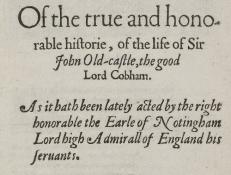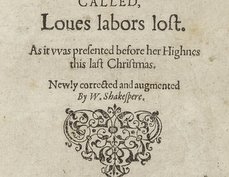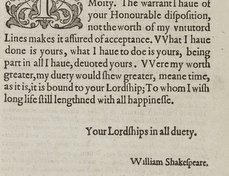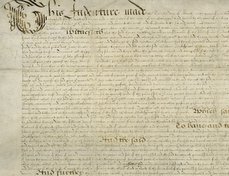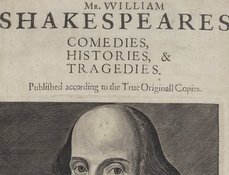From the collections of: THE BRITISH LIBRARY
Terms of use
The British Library has graciously contributed the above images to Shakespeare Documented under a Creative Commons Public Domain Mark.
Copyright status of the manuscript and unpublished Materials: The 1988 Copyright, Designs and Patents Act (as amended) states that unpublished literary and artistic works remain in copyright in the UK until at least 31 December 2039. Therefore important parts of the library’s collection remain in copyright, including very old manuscripts. However for unpublished material created many centuries ago and in the public domain in most other countries, the Library believes this material to be very unlikely to offend anyone. As an institution whose role it is to support access to knowledge, we have therefore taken the decision to release certain digitised images technically still in copyright in the UK under the Public Domain Mark.
Document-specific information
Creator: Richard James
Title: (Gr. xxxv.) " THE LEGEND and defence of ye Noble Knight and Martyr Sr John Oldcastel. Sett forth by Richard James, Bachelour of Divinitie and Fellow of C[orpus] C[hristi] C[ollege] in Oxford " (ob. 1638). Consisting of a transcript of Thomas Occleve
Date: 1624-36
Repository: The British Library, London, UK
Call number and opening: Add. MS 33785, fol. 2r-v
View online bibliographic record
Heather Wolfe, "Shakespeare's Oldcastle/Falstaff controversy: Richard James's account," Shakespeare Documented, https://doi.org/10.37078/583.
British Library, Add. MS 33785. See Shakespeare Documented, https://doi.org/10.37078/583.
The antiquarian Richard James (1592-1638), fellow of Christ Church College, Oxford, explains in this dedicatory letter to Sir Henry Bourchier why Shakespeare changed the character originally named “Sir John Oldcastle” to one named “Sir John Falstaff” in Henry IV, Parts 1 and 2. After defending the Protestant heroism of the real historical figures with those names (the English Lollard martyr Sir John Oldcastle, d. 1417 and Sir John Fastolf, 1380-1459), James suggests that because the Oldcastle character in Shakespeare’s plays was a “buffoon,” the “Personages descended from his title” took offense. The offended descendants were William Brooke, tenth Baron Cobham, and his son, Henry. Brooke was patron of Shakespeare’s company, the Lord Chamberlain’s Men, at the same time that the plays were being performed.
The dedicatory letter prefaces James's manuscript edition of Thomas Hoccleve's (1368-1426) poem "The legend and defense of the Noble Knight and Martyr Sir John Oldcastle." Another manuscript version of James's edition appears among his papers at the Bodleian Library (MS James 34).
James Orchard Halliwell-Phillipps was the first to draw attention to the letter, printing it in On the Character of Sir John Falstaff: As Originally Exhibited by Shakespeare in the Two Parts of King Henry IV (London: Pickering, 1841).
The Legend and defense of the Noble Knight and Martyr Sir John Oldcastle, set forth by Richard James, Bachelor of Divinity, and Fellow of Christ Church College in Oxford.
Aristotle [Greek writing]
To my Noble friend Sir Henry Bourchier
Sir Harry Bourchier, you are descended of Noble Ancestry, and in the duty of a good man love to hear and see fair reputation preserved from slander and oblivion. Wherefore to you I dedicate this edition of Occleve, where Sir John Oldcastle appears to have been a man of valor and vertue, and only lost in his own times because he would not bow under the foul superstition of Papistry, from whence in so great light of Gospel and learning that there is not yet a more universal departure, is to me the greatest scorn of men. But of this more in another place; and in preface will you please to hear me that which follows. A young Gentle Lady of your acquaintance having read the works of Shakespeare made me this question. How Sir John Falstaffe or Fastalf, as he is written in the statute book of Magdalen College in Oxford, where every day that society were bound to make memory of his soul, could be dead in the time of Harrie the fifth, and again live in the time of Harrie the sixth, to be banished for cowardice: Whereto I made answer that it was one of those humors and mistakes for which Plato banished all poets out of his commonwealth. That Sir John Falstaff was in those times a noble valiant soldier as appears by a book in the Herald's Office dedicated unto him by a Herald, who had been with him, if I will remember, for the space of 25 years in the French wars; that he seems also to have been a man of learning, because in a library of Oxford I find a book of dedicating Churches sent from him for a present unto Bishop Wainfleet and inscribed with his own hand. That in Shakespeare's first show of Harrie the fifth [Henry IV, part 1], the person with which he undertook to play a buffoon was not Falstaff but Sir John Oldcastle, and that offence being worthily taken by Personages descended from his title (as peradventure by many others also who put to make an ignorant shift [fol. 2v] of abusing Sir John Fastalf a man not inferior of vertue, though not so famous in piety as the other, who gave witness unto the truth of our reformation with a constant and resolute Martyrdom, unto which he was pursued by the Priests, Bishops, Monks, and Friars of those days. Noble Sir, this is all my preface. God keep you, and me and all Christian people, from the bloody designs of that cruel Religion.
Yours in all observance,
Richard James
The Legend and defence of the Noble Knight and
Martyr Sir John Oldcastel.
sett forth
by Richard James Bachelour of Divinitie,
and Fellowe of C.C.C. in Oxford.
Aristotle
[Greek writing]
To my Noble friend Sir Henry
Bourchier
Sir Harrie Bourchier, you are descended of Noble Auncestrie,
and in the dutie of a good man love to heare &
see fair reputation preserved from slander and
obliuivion. [sic] Wherefore to you I dedicate this editi=
=on of Ocleve, where Sir John Oldcastel apeeres
to have binne a man of valour and vertue, and
only lost in his own times because he would not
bowe under the foule superstition of Papistrie, from
whence in so great light of Gospel and learning
that there is not yet a more universal departure,
is to me the greatest scorne of men. But of this more
in another place; and in preface will you please
to hear me that which followes. A young Gentle
Lady of your acquaintance having read the works
of Shakespeare made me this question. How Sir JohnOldcastle Falstaffe or Fastalf, as he is written in the
statute book of Maudlin Colledge in Oxford, where e=
verye day that society were bound to make memorie
of his soul, could be dead in the time of Harrie the
fift, and again live in the time of Harrie the sixt
to be banished for cowardize: Whereto I made an=
swear that it was one of those humours and
mistakes for which Plato banisht all poets out of
his commonwealth. That Sir Ihon Falstaffe was in those
times a noble valiant souldier as apeeres by a book
in the Heralds Office dedicated unto him by a Herald,
who had binne with him, if I will remember for the
space of 25 yeares in the French wars, that he seems
also to have binne a man of learning, because in a
Library of Oxford I find a book of dedicating Churches
sent from him for a present unto Bishop Wainflete
and inscribed with his own hand. That in Shakespeares
first shew of Harrie the fift, the person with which he
undertook to playe a buffone was not Falstaffe but Sir Ihon
Oldcastle, and that offence being worthily taken by Per=
=sonages descended from his title (as peradventure by
many others allso whoe putt to make an ignorant shifte
[fol. 2v]
of abusing Sir Ihon Fastolphe a man not inferior of Ver-
-tue, though not so famous in pietie as the other, who
gave witnesse unto the truth of our reformation with
a constant and resolute Martyrdom, unto which he was
pursued by the Priests, Bishops, Moncks, and Friers of
those days. Noble Sir, this is all my preface. God keep
you, and me and all Christian people, from the bloody
designes of that cruell Religion.
Yours in all observance
Rich. James
Written by Heather Wolfe
Last updated February 23, 2020



